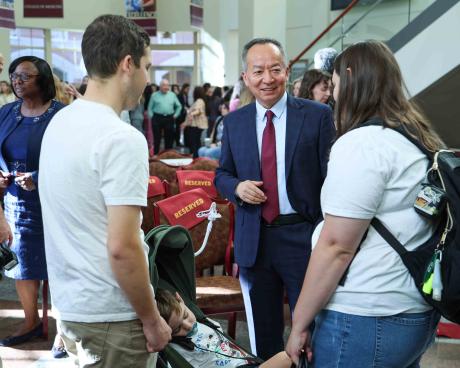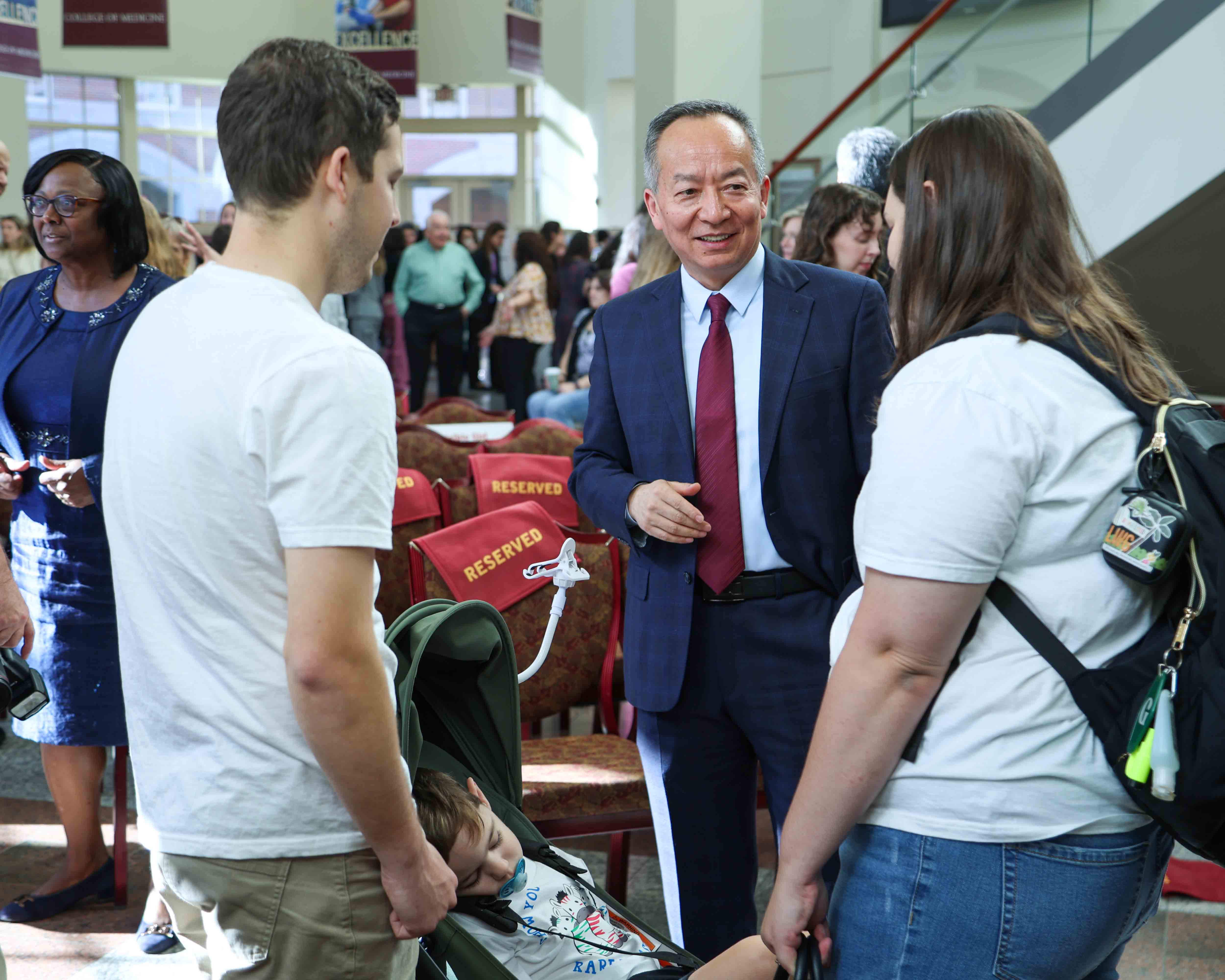Rare Disease Day highlights progress, provides hope for families


Rare Disease Day, recognized globally on the last day of February since 2008, is intended to raise awareness of the approximately 7,000 known rare diseases affecting 300 million people worldwide.
“It’s a day of recognition and it is also a day of action,” Pradeep Bhide, Ph.D., director of the Florida State University Institute for Pediatric Rare Diseases (IPRD), told a standing-room-only crowd Friday, Feb. 28, at the FSU College of Medicine.
“The burden of rare diseases is enormous, not just on the children who are facing challenges every day, but also on their families and our society as a whole… We are committed to changing the narrative.”
Rare Disease Day 2025 at FSU provided a forum for university and state leaders to lay out the plans for IPRD. More importantly, it was a platform showing the work already underway at the institute, which sprung from a meeting between state Rep. Adam Anderson and FSU President Richard McCullough less than two years ago.
“I am completely blown away with the rapid pace and the progress that has been made,” Anderson said, as he stood near the podiums of posters holding 13 of the 23 current IPRD research projects, thanks to legislative and university funding. “It has completely exceeded any expectations that I had.”
Review the program
Those research projects represent the interdisciplinary collaboration of 20 scientists representing seven departments across three Florida State University colleges.
“At FSU, we believe in the power of science, education and collaboration to solve humanity’s most pressing challenges,” McCullough said at the opening news conference, joined by College of Medicine Dean Alma Littles, past president of the National Tay-Sachs & Allied Diseases Association Oralea Marquardt, Anderson and Bhide. “Through the work of the institute, we are paving the way for a brighter, healthier future for all children.”
Members of the FSU Board of Trustees were on hand, along with several families affected by rare diseases, some accompanied by their children.
Moriah and Nic George made the drive to Tallahassee from Palm Coast, Florida with their 3-year-old son Luca, who is one of 60 children worldwide diagnosed with SPATA5L1 Disorder. The disorder includes a wide spectrum of symptoms – including hearing loss, lack of muscle development and control and seizures – which impact Luca.
“It’s real important for us to come to things like this where people do care, because he’s not just SPATA5L1, he’s Luca,” Moriah said, following the news conference and symposium. “Being able to meet not only researchers, but other families that understand, it is really important. Having a child with a rare disease is really isolating, from the diagnosis to having other parent friends with typical kids is hard, because I get to watch other kids run around and play and Luca doesn’t do that.
“Meeting other families and the researchers is helping us feel less alone, knowing there are people who are out there that are researching and advocating for children.”
Anderson laid out the “next big step” in his push for legislative support of rare disease research, introducing Florida House Bill 907 – the Sunshine Genetics Act – which aims to make Florida a national leader with opt-in newborn genetics screening, free of charge, and establish a national consortium of universities, children’s hospitals and industry professionals to coordinate and collaborate on their research and cures for rare diseases. It also includes further funding for IPRD.
“What we saw today, having so many families here, it gives the folks doing the work – the boots on the ground – the opportunity to interact and see the impact they are having on families,” Anderson said. “I hope that inspires them and it motivates them.”
Anderson’s push in the pediatric rare disease space remains driven by the 2019 loss of his son, Andrew, to Tay-Sachs disease.
“That’s my favorite part of working in this field, getting to know these families,” he said. “I can relate to what they’re going through and understand firsthand. Every time I see them, it’s a reminder of why we’re doing this.”
The event moved into the Durell Peaden Auditorium where a symposium featuring three ongoing IPRD research presentations, comments from Leah Barber from the National Organization of Rare Disorders, and the keynote address from IPRD Associate Director for Precision Medicine, David Ledbetter. Ledbetter, a renowned clinical geneticist, recently joined the College of Medicine from the University of Florida-Jacksonville.
Ledbetter shared his enthusiasm for joining the IPRD, citing the support for university and legislative leaders as one reason.
“With a shared mission and commitment to improving and increasing clinical care, research and education for pediatric rare disease … every medical geneticist in the United States and the world, both the physicians trained as clinical geneticists, the clinical laboratory geneticists like myself and the genetic counselors, all would love to be part of that comprehensive mission,” he said.
And while acknowledging the challenges involved, he said transformational advances in genomics have moved rare disease diagnosis from science fiction to possible treatments and cures over the course of his 40-year career.
“As we mark Rare Disease Day, let us remember that awareness is just the beginning,” Littles said. “The real impact comes from action. Together, we have the ability to transform the future of rare disease diagnosis, treatment and care.
“Together, we can ensure that families no longer feel isolated and forgotten. And together, we can build a future where every child – no matter how rare their condition – has access to the best possible care and the brightest possible future.”
Contact Bob Thomas at Robert.Thomas@med.fsu.edu

